非限制性定语从句
非限制性定语从句

非限制性定语从句非限制性定语从句根据定语从句与先行词的关系,定语从句可分为限制性定语从句及非限制性定语从句。
限制性定语从句紧跟先行词,主句与从句不用逗号分开,从句不可省去;非限制性定语从句主句与从句之间有逗号分开,起补充说明作用,如省去,意思仍完整。
以下是店铺整理的非限制性定语从句,欢迎大家借鉴与参考,希望对大家有所帮助。
非限制性定语从句 1非限制性定语从句:即非限定性定语从句,起补充说明作用,缺少也不会影响全句的理解,在非限定性定语从句的前面往往有逗号隔开,如若将非限定性定语从句放在句子中间,其前后都需要用逗号隔开。
由as, which 引导的非限定性定语从句,as和which可代整个主句,相当于and this或and that。
As一般放在句首,which在句中。
使用规则及注意事项:1、which引导的非限定性定语从句是用来说明前面整个句子的情况或主句的某一部分。
2、as有时也可用作关系代词。
as引导非限制性定语从句,若as在从句中作主语,其引导的句子可以放在句首,也可以放在句中。
但which引导的非限制性定语从句只能放句中。
例句:As is reported in the newspaper, some artistic treasures (艺术珍品) will be on show at the exhibition on the weekend.3、在非限定性定语从句中,关系词不能用that。
限制性定语从句和非限制性定语从句有四大区别:1在句中作用不同限制性定语从句对被修饰的先行词有限定制约作用,使该词的含义更具体,更明确。
限制性定语从句不能被省略,否则句意就不完整。
非限制性定语从句与先行词关系不十分密切,只是对其作一些附加说明,不起限定制约作用。
如果将非限制性定语从句省去,主句的意义仍然完整。
2外在表现形式不同限制性定语从句因与先行词关系密切,所以不可以用逗号将其与主句隔开;而非限制性定语从句与先行词关系不十分密切,所以可用逗号将其与主句隔开。
非限制性定语从句

(1)限制性定语从句和主句的关系十分密切, 若省去,主句的意思就不明确。主从句之间 不用逗号隔开。而非限制性定语从句则不然。 试比较:
This is the best book that I have read. This is a good book, which is easy to understand.
(2) as多用于下列习惯用语中 as anybody can see 正如人人都能看到的那样 as is well known = as is known to all 众所周知 as we had expected 正如我们所预料的那样 as often happens 正如经常发生的那样 as has been said before 如上所述 as is mentioned above 正如上面提到的
(5)关系代词在非限制性定语从句中作介词的宾语 时,介词前可以有被介词短语所修饰的词。如: He has two daughters, the elder of whom is married. (6)在非限制性定语从句中,关系代词还可以 作介词的宾语。 He is ill, in spite of which he keeps on studying.
3. 关系代词as, which引导非限制定语从句时的区别
(1)as和which都可指主句的整个意思,而不是主 句中的某一个词。as引导的非限制性定语从句, 既可在主句前,又可在主句后,有时还可插入主 句中;而which引导的非限制性定语从句一般置于 主句之后。如: The weather turned out to be very good, which was more than we could expect. As is known to all, the moon travels round the earth.
英语中限制性定语从句和非限制性定语从句
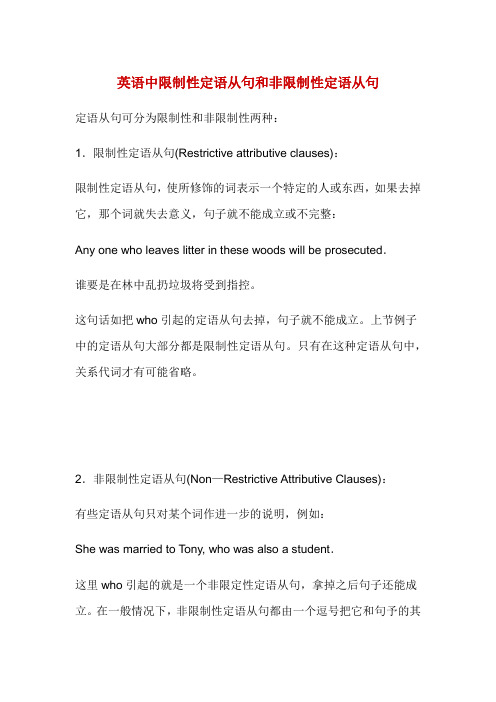
英语中限制性定语从句和非限制性定语从句定语从句可分为限制性和非限制性两种:1.限制性定语从句(Restrictive attributive clauses):限制性定语从句,使所修饰的词表示一个特定的人或东西,如果去掉它,那个词就失去意义,句子就不能成立或不完整:Any one who leaves litter in these woods will be prosecuted.谁要是在林中乱扔垃圾将受到指控。
这句话如把who引起的定语从句去掉,句子就不能成立。
上节例子中的定语从句大部分都是限制性定语从句。
只有在这种定语从句中,关系代词才有可能省略。
2.非限制性定语从句(Non—Restrictive Attributive Clauses):有些定语从句只对某个词作进一步的说明,例如:She was married to Tony, who was also a student.这里who引起的就是一个非限定性定语从句,拿掉之后句子还能成立。
在一般情况下,非限制性定语从句都由一个逗号把它和句予的其它部分分开,在译成汉语时多译成一个并列句。
下面例句中部包含有非限制性定语从句:The note was left by Jim,who was here a moment ago.这个条子是吉姆留的,他刚才来过。
She introduced me to her husband,whom I hadn’t met before.她把我介绍给她丈夫,这人我以前没见过。
This is George,whose class you will be taking.这是乔治,你将接他的班。
I have many friends,some of whom were painters.我有许多朋友,其中有些是画家。
She was very fond of speaking French,which indeed she spoke well.她很喜欢讲法语,而且讲得确实很好。
定语从句-非限制性定语从句
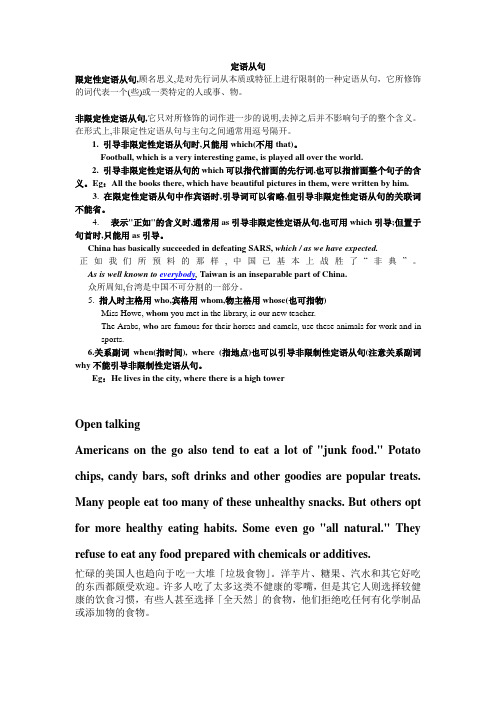
定语从句限定性定语从句,顾名思义,是对先行词从本质或特征上进行限制的一种定语从句,它所修饰的词代表一个(些)或一类特定的人或事、物。
非限定性定语从句,它只对所修饰的词作进一步的说明,去掉之后并不影响句子的整个含义。
在形式上,非限定性定语从句与主句之间通常用逗号隔开。
1. 引导非限定性定语从句时,只能用which(不用that)。
Football, which is a very interesting game, is played all over the world.2. 引导非限定性定语从句的which可以指代前面的先行词,也可以指前面整个句子的含义。
Eg:All the books there, which have beautiful pictures in them, were written by him.3. 在限定性定语从句中作宾语时,引导词可以省略,但引导非限定性定语从句的关联词不能省。
4.表示"正如"的含义时,通常用as引导非限定性定语从句,也可用which引导;但置于句首时,只能用as引导。
China has basically succeeded in defeating SARS, which / as we have expected.正如我们所预料的那样,中国已基本上战胜了“非典”。
As is well known to everybody, T aiwan is an inseparable part of China.众所周知,台湾是中国不可分割的一部分。
5. 指人时主格用who,宾格用whom,物主格用whose(也可指物)Miss Howe, whom you met in the library, is our new teacher.The Arabs, who are famous for their horses and camels, use these animals for work and in sports.6.关系副词when(指时间), where (指地点)也可以引导非限制性定语从句(注意关系副词why不能引导非限制性定语从句。
非限制性定语从句

games and songs. 6. He is absorbed in work, ____he often was.
hometown,will open next year. 3. We shouldn’t spent our money testing so many people, most of
_____are healthy 4. Chan’s restaurant on Baker Street, ____used to be poorly run, is now
(2)Xi’an, which we visited last year, is really a beautiful city.
(3) My favorite season is autumn, when we celebrate the Mid-Autumn
Festival.
2. 在限制性定语从句中,作宾语的关系代词可以省略,但在非限制性 定语从句中,作宾语的关系代词不能省略。如:
(1)His father, who is a famous actor, will go to Canada next week.
(2)I was born in Beijing, which is the capital of China. 2. 当先行词被指示代词、形容词或物主代词修饰时,要用非限制性定 语从句。如:
练习: 1. His movies won several awards at the film festival, _____was beyond
非限制性定语从句

U n i t5G r a m m a r定语从句非限制性定语从句一.概述非限制性定语从句的前面往往有逗号隔开;如若将非限定性定语从句放在句子中间;起前后都需要用逗号隔开..1)The other day I met Li Lei; who seemed to be very busy.不久前的一天我碰上李雷了;他好象很忙..2)His mother; who loves him very much; is strict with him. 他妈妈很爱他;对他要求很严格..非限制性定语从句和单句的比较1)He failed in the exam. _It_ made his parents angry.2)He failed in the exam; It made his parents angry.3)He failed in the exam; _which made his parents angry.二.非限制性定语从句应注意以下几点:一非限制性定语从句中的关系词:1. 关系代词如下表所示:1)The house; ______ we bought last month; is very nice.这幢房子很漂亮;是我们上个月买的..2)Miss Howe; _______you met in the library; is our new teacher.3)Yesterday I bought a T-shirt; ________only cost me 18 Yuan.4)Tom’s father; ________is over sixty; still works hard day andnight.汤姆的父亲已经六十多岁了;但他仍然从早到晚忙碌地工作..5)Li Ming; ________ mother has been ill for two days; is absent fromschool today.6)Yesterday she sold her car; _______ she bought a month ago.7)John’s wife; ____woks in Beijing ;came back home yesterday.注意:非限制性定语从句中关系代词which/whom在从句中作宾语时;不可省略..1)This book; which you can get at any bookshop; will give you all theinformation you need.这本书会给你提供所有你需要的资料;它在任何一家书店都能买到..2)This morning I met Tom; whom I hadn't seen for ages.今天早上我碰见汤姆;我很多年未见到他了..2.关系副词有when和where;关系副词why不能引导非限制性定语从句;要用for which代替..1)Yesterday Jimmy left for Canada; _______ he had stayed two years.昨天;吉米动身到加拿大去了;他曾在那儿呆了两年..2)The People’ s Republic of China was founded in 1949; _________hewas born.3)I had told them the reason; __________I didn’t attend the meeting. 二关系代词前介词的选择..1.依据定语从句中动词的习惯搭配来确定1)I bought a great many books; ______which I spent all my money thatI saved.我买了很多书;这些书花了我所有的积蓄..2)This project; _______which I have devoted lots of time; will bea great success.这项工程我投入了很多时间;肯定能成功..2.依据先行词的某种习惯搭配来确定1)I’ll never forget the time; during which I spent my childhood inthe country.我永远不会忘记我在乡村度过的童年时光..2)Her bag; in which she put all her books; has not been found.用适当的介词填空:1)In the dark street; there wasn’t a single person ___whom she couldturn for help.2)At last we found the hole in the wall _________ which the mouse gotinto the house last night.三含有“不定代词both/some/any/all/none等或基数词+of which/whom“结构的非限制性定语从句1)He has three sons; all of whom are college students.2)There are 51 students in Class Three;none of whom failed in themonthly examination last week.3)Here are the questions; some of which I thought are difficult foryou.4)Present at the meeting were almost experts on DNA; most of whom camefrom the US.出席会议的大都是DNA专家;其中大部分来自美国..5)I have three foreign teachers; two of whom are from Canada.填空:We shouldn’t spend our money testing so many people; most o f ______are healthy.小贴士此类题解题的关键是看句中的标号.. 如果是逗号;通常考虑关系词;反之;考虑人称代词..1)He has two sons. Both of ________ are teachers.2)He has two sons; both of ________ are teachers.四关系代词as的用法1.as 与which 都可以代指主句整个句子的内容;有时可以互换He is a doctor ;as/which we know from his manner.2. 区别点:A.as引导的定语从句可以放在句首;而which 则不能..B.as意为“正如……”;后面的谓语动词多是see;know;expect;say;mention;report;announce等;which意为“这一点”..1)He didn’t know French; which made it difficult for him to studyat a university in France.2)Smoking is harmful to one's health;as we know;3)As we know;more than seventy percent of the earth is covered withwater.正如我们所知;地球表面的70%以上被水覆盖..4)He came back home late;as we expected.正如我们所料;他回家晚了..注意:as的固定结构:She is late;as is often the case.她迟到了;这是经常的事Taiwan;as you know;is an inseparable part of China.你知道;台湾是中国不可分割的一部分..As is announced in the papers;our country has launched another man-madeearth satellite.报纸宣布;我国又发射了一颗人造地球卫星..I’ve never heard such a wonderful song as he’s singing.即学即练:1)The number of the students in senior high schools isincreasing;________is mentioned above;2)________is often the case with elder people;my grandma talked aboutmy new hairstyle for at least 50 minutes nonstop.比较:It is so heavy a box as no man can lift.这是一个没有人搬得动的大盒子..It is so heavy a box that no man can lift it.This is such a novel as all people;both young and old;like to read.. This is such a novel as all people;both young and old;like to read it.高考链接:1. I walked in our garden; _______ Tom and Jim were tying a big sign onto one of the trees.2. The Beatles; _______ many of you are old enough to remember; came from Liverpool.3. She was educated at Beijing University; ____ she went on to haveher advanced study abroad.4. Last week; only two people came to look at the house;_______ wantedto buy it.5. It is reported that two schools; _____ are being built in my hometown;will open next year.6. The growing speed of a plant is influenced by a number of factors;_____ are beyond our control.7. They will fly to Washington; _____they plan to stay for two or three days.8. Many children; ______ parents are away working in big cities; aretaken good care of in the village.9. Whenever I met her; _______ was fairly often; she greeted me witha sweet smile.10. As a child; Jack studied in a village school; _______is named after his grandfather.11. The settlement is home to nearly 1;000 people; many of _____ left their village homes for a better life in the city.12. Our teacher urges us to form a good habit of learning;________wethink will benefit us in the13. Remember that there is still one point________we must make clearat the conference tomorrow.14. All the neighbors admire this family;________the children andparents build up a friendly relationship.15.As to the unemployment;the government has taken a series of measuresin many areas;________;I am sure;will benefit the people out of work. 16The reason _______ he was late again was that he was caught in a traffic jam in the rush hour. 117.I hate the way _______ you talk to your mother.18.You think the reason _______ he gave is believable.19.____ is reported in the newspaper ; talks between the two countries are making progress.20. Is this museum _____they visited last month21.---- Where did you meet him first ----- It was in the hotel _he stayed.22. David is such a good boy _______ all the teachers like.23. A man with a bleeding hand hurried in and asked; “Is there ahospital around ______ I can get some medicine for my wounded hand ”24. They put forward a lot of plans at the meeting; but none of _______were carried out in their work.25. Sundays there were a lot of children playing in the park; ____parents were seated together joking.2014辽宁卷Dear Jeremy and Alice;Although we’ve been delighted to have you as neighbors; we’re hoping to settle something that bothers to us. In a word; your dog—Cleo. We’ve called several time about Cleo’s early morning barking. It is difficult to understan ding why she barks every minute she’s outside. The early morning barking have been disturbing us as wc arc often up all night with the baby. Beside; Cleo tends to bark a average of six hours a day. This morning she starts barking even before 5 o’clock. That is too much for us. considering how closely the houses are. We appreciate our apologies and goodwill; but we hope that you can figure a good way of settling the matter.2014陕西卷My father took me out camping for the first time when I was seven. He wanted teach me about animals; insects and trees. My uncles all come along with bows and arrows for hunting.One evening at sunset; we sat by the fire; have our barbecue. Just then a bird was flying over us. My uncles immediate jumped up and shot their arrows on the bird. Neither of the arrows hit the target.Suddenly the arrows was flying down at us from the sky — they were looked like rain We ran to escape but fortunately no one was injured.That day I didn’t learn much about animals; insects or trees; but I learnt a impressive lesson about gravity答案去掉us前面的to试题解析动词bother困扰;麻烦;这是一个及物动词;后面直接加宾语;不需要使用介词to..2. 答案time改为times试题解析本句中的time表示“次数”;是一个可数名词;前面有several修饰;说明使用复数形式..3. 答案understanding改为understand试题解析本句中的it是一个形式主语;真正的主语是后面的不定式结构to understand why….;不定式结构中to后面要接动词原形..4. 答案have改为has试题解析本句的主语是单个的动名词短语the early morning barking;做主语时;谓语动词要使用单数形式..5. 答案beside改为beside试题解析介词beside以为“在…旁边”;本句中的besides是一个副词“而且”;单独使用;表示递进关系..6. 答案bark后面的a改为an试题解析名词average是以元音开始的单词;所以使用an修饰average of…..7. 答案starts改为started试题解析本句叙述的是具体早晨发生的事情;也就是过去所发生的事情;所以使用一般过去时started..8. 答案closely改为close试题解析本句how close the houses are中的close本应该是在系动词are 的后面;构成系表结构are close..Closely是一个副词;副词通常不能和许系动词连用构成系表结构的..9. 答案our改为your试题解析句义:我们很欣赏你的歉意..根据后面的you可知对方是来道歉的..10. 答案figure后面加out试题解析固定搭配figure out找到;算出..我们希望你能够找到一个解决问题的好方法..1.答案wanted后面加to试题解析固定搭配want to do sth想要做某事;to是不能省略的;不定式to do sth作为want的宾语..2. 答案come改为came试题解析根据本文第一句可知讲述的是过去发生的事情;所以使用一般过去时;所以使用came..3. 答案have改为having试题解析本句中动词have与句子主语we构成逻辑上的主动关系;所以使用现在分词在句中做状语..4. 答案immediate改为immediately试题解析本句中应该使用副词immeately来修饰谓语动词jumped;在句中做状语..形容词immediate不能做状语..5. 答案on改为at试题解析固定搭配shoot..at…不能使用介词on..At表示瞄准的对方或者方向..6. 答案Neither改为none试题解析代词neither表示两者都不…;而本句中没有提及两者;应该是有很多的鸟..故使用none表示三者或者三者以上的全部否定..7. 答案was改为were试题解析本句的主语是复数名词arrows;所以谓语动词使用复数形式were..8 答案去掉were或者looked试题解析本句是指箭如雨下;要么使用look like看起来像..;要么使用be like…像…一样..9. 答案but改为and试题解析我们四处逃跑;很幸运的是没有人受伤..根据上下文语境可知表示并列关系..10. 答案a改为an试题解析后面的形容词impressive是以元音开始的;所以使用an..。
什么是非限制性定语从句

什么是非限制性定语从句定语从句有限制性和非限制性两种。
限制性定语从句是先行词不可缺少的部分,去掉它主句意思往往不明确;非限制性定语从句是先行词的附加说明,去掉了也不会影响主句的意思,它与主句之间通常用逗号分开,将非限定性定语从句放在句子中间,其前后都需要用逗号隔开。
非限制性定语从句可以简单理解为就是没有紧跟在修饰对象(即先行词)之后的定语从句,与限制性定语从句刚好相反。
也就是说,先行词和非限制性定语从句之间常被逗号或是其它语句部分隔开,而没有紧密连接在一起。
需要注意的是:1)引导词that(关系代词)和why(关系副词)一般不用于引导非限制性定语从句。
2)引导词which(关系代词)在引导非限制性定语从句时,不仅可以指代主句的某部分内容,还可以用来指代整个主句。
具体示例如下:(下划线部分是非限制性定语从句;加粗字体是该定语从句的修饰对象,也就是先行词。
)例1:I am looking for a watch, which Jason bought me.例2:The puppy peed in his arms, which made us laugh.例3:Penny, who used to be a waitress, becomes a successful saleswoman.例4:Many people witnessed the accident, some of whom called the police.例5:Jacob is the silent boy standing in the back, whose hair is black and straight.例6:He realized the days were all over when they could talk everything to each other.例7:She wandered in the school alone and aimlessly, where they last met.值得注意的是,由于定语从句的本质是形容词,通常只起到修饰作用,所以定语从句本身一般不会对主句的完整性产生任何影响。
非限制性定语从句

非限制性定语从句1. 定义非限制性定语从句(Non-restrictive Relative Clauses)是指用来修饰一个名词或代词,且不对其进行限定的定语从句。
这种从句通常提供一些额外信息,而不是对名词或代词进行修饰、定义或区分。
非限制性定语从句和限制性定语从句的区别在于非限制性定语从句用逗号或破折号将其与主句分隔开来,而限制性定语从句则不用分隔符。
例如:•限制性定语从句:The book that I borrowed last week was very interesting.•非限制性定语从句:My friend, who is a doctor, came to visit me.非限制性定语从句通常用来提供额外的信息,使得整个句子更加丰富和具体。
2. 结构非限制性定语从句的结构相对简单,通常由关系副词(如where, when, why)或关系代词(如who, whom, which)引导,并且使用逗号或破折号将其与主句分隔开来。
以下是一些常见的关系代词和关系副词:•关系代词:who, whom, whose, which, that•关系副词:where, when, why例如:•关系代词引导的非限制性定语从句:My brother, who is a teacher, lives in London.•关系副词引导的非限制性定语从句:I still remember the day, when we went to the beach.3. 示例以下是一些示例,以帮助读者更好地理解非限制性定语从句的用法和作用。
1.This is my father, who is an engineer.2.The house, which was built in the 19th century, is now a museum.3.She loves music, which is why she plays the piano every day.4.The dog, whose tail is wagging, seems very happy.5.Tom finally got the job, which he had been dreaming of.4. 注意事项在使用非限制性定语从句时,需要注意以下几点:•逗号或破折号:非限制性定语从句通常使用逗号或破折号与主句分隔开来,这有助于读者更好地理解句子的结构和意思。
非限制性定语从句

• (3)He is against the idea, as can be expected. • (4)He has to work on Sundays, which he doesn’t like.
• 5)She remarried, as we had expected.
• (6)She remarried, which we unexpected.
• Our teacher, who is getting old,will soon retired.
They cut open the boot of the man, whose leg was broken.
名师伴你行
2.由介词+which和介词+whom等引导非 限制性定语从句:
Here are players from Japan, some of (whom ) are our old friends.
• • • • • •
在非限制性定语从句中 1. 不能用that 2关系代词做宾语时不能省略。 3 whom 在从句中作宾语时不能用who或 that代替。 4 可以修饰整个句子,有逗号隔开,只 能由which或as引导
• 5. 在翻译时,限句常译为定语, 非限句常译为并列句或状语从句。
名师伴你行
名师伴你行
限制性定语从句是先行词不可缺少的 定语,而非限制性定语从句只是附加 说明,如果去掉,主句意思仍然清楚。 非限制性定语从句用逗号与主句隔开。
1.由which, who, whom, whose, where, when等引导:
•
Football, which is a very interesting game, is played all over the world.
非限制性定语从句
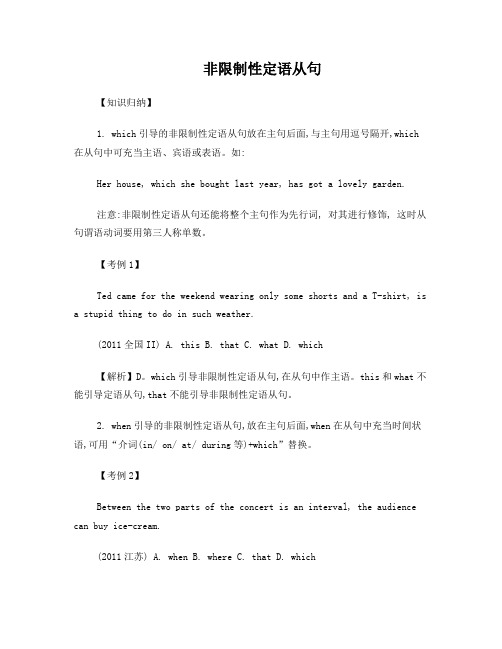
非限制性定语从句【知识归纳】1. which引导的非限制性定语从句放在主句后面,与主句用逗号隔开,which在从句中可充当主语、宾语或表语。
如:Her house, which she bought last year, has got a lovely garden.注意:非限制性定语从句还能将整个主句作为先行词, 对其进行修饰, 这时从句谓语动词要用第三人称单数。
【考例1】Ted came for the weekend wearing only some shorts and a T-shirt, is a stupid thing to do in such weather.(2011全国II) A. this B. that C. what D. which【解析】D。
which引导非限制性定语从句,在从句中作主语。
this和what不能引导定语从句,that不能引导非限制性定语从句。
2. when引导的非限制性定语从句,放在主句后面,when在从句中充当时间状语,可用“介词(in/ on/ at/ during等)+which”替换。
【考例2】Between the two parts of the concert is an interval, the audience can buy ice-cream.(2011江苏) A. when B. where C. that D. which【解析】A。
分析句子结构可知,这是先行词为interval的非限制性定语从句。
由于从句部分不缺少主干成分,而且interval表时间,所以正确答案为A。
3. where引导的非限制性定语从句,放在主句后面,where在从句中充当地点状语,可用“介词(in/ on/ at 等)+which”替换。
如:【考例3】Whatever is left over may be put into the refrigerator, it will keep for two or three weeks. (2011安徽)A. whenB. whichC. whereD. while【答案】C。
非限制性定语从句
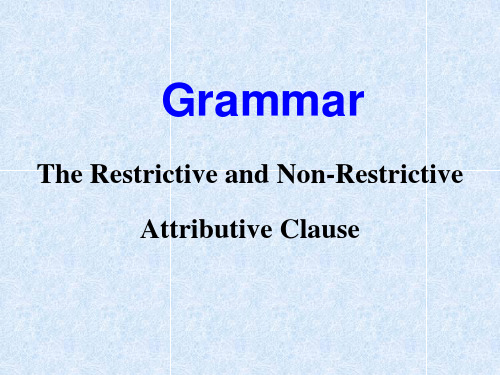
3. The gentleman ______ B you told me
yesterday proved to be a thief.
which is the capital of China, 2. Beijing, _________
has a very long history.
As is known to all, he is the best student. 3. ______
4. The young man had a new girl friend, who ________ is a pop star.
Li Ping worked.
A. in whose B. whose C. in whom D. of which 12. I don't like the way _____ D you speak to her. A. / C. in which B. that D. All A, B, and C
can park their men, women will spend more time in the shop. A. that B. which C. when D. where
高考真题
1. By nine o’clock, all the Olympic torch bearers had reached the top of Mount Qomolangma, ____ D appeared a rare rainbow soon. (2008 福建) A. of which B. on which C. from which D. above which
非限制性定语从句

非限制性定语从句非限制性定语从句非限定性定语从句:非限定性定语从句的作用是对所修饰的成分作进一步说明,通常和主句间用逗号隔开,将从句拿掉后其他部分仍可成立1. which引导的非限定性定语从句来说明前面整个句子的情况或主句的某一部分,that不能用于引导非限制性定语从句eg:Her house,which was built a hundred years ago,stood still in the earthquake.2. 有时as也可用作关系代词3. 在非限定性定语从句中,用who, whom代表人,用which代表事物.4.当先行词是专有名词或物主代词和指示代词所修饰时,其后的定语从句通常是非限制性的。
eg:Charles Smith, who was my former teacher, retired last year.My house, which I bought last year, has got a lovely garden. 我去年买的的那幢房子带着个漂亮的花园。
This novel, which I have read three times, is very touching. 这本小说很动人,我已经读了三遍。
5.非限制性定语从句还能将整个主句作为先行词, 对其进行修饰, 这时从句谓语动词要用第三人称单数,eg:He seems not to have grasped what I meant, which greatly upsets me. 他似乎没抓住我的意思,这使我心烦。
总结:非限制性定语从句只是对主句内容,或先行词的补充、解释或附加说明。
主句与先行词或从句之间一般用逗号分开,常常单独翻译。
没有它,主句意思仍然完整。
引导非限制性定语从句的关系代词有as,which,who,whom,whose等,作定语从句的主语、宾语、表语及定语。
关系副词有when,where等,作定语从句的状语。
非限制性定语从句

省略法
总结词:省略不译
详细描述:省略法是指在翻译过程中,对于不影响语义的非限制性定语从句进行省略不译,以使译文更加简洁明了。这种方 法适用于从句内容简单或与主句重复的情况。例如,“The car which is blue is mine.”可省略不译为“蓝色的车是我的。 ”
05
非限制性定语从句的常见错误分 析
表达说话者的态度或观点
总结词
非限制性定语从句可以用来表达说话者的态度或观点,为整个句子添加主观色彩。
详细描述
非限制性定语从句可以用来传达说话者对先行词的主观评价或情感态度,使整个句子更加生动有力。例如, “The movie, which I thought was amazing, was highly praised by critics.”(我觉得那部电影非常 棒,也受到了评论家的高度赞扬。)
意译法
要点一
总结词
摆脱原句结构,传达意义
要点二
详细描述
意译法是指不拘泥于原句的语序和结构,而是通过调整语 序、增减词汇等方式来传达原文的含义。这种方法适用于 结构复杂或不符合汉语表达习惯的非限制性定语从句。例 如,“The book which is written by John is very popular.”可意译为“约翰写的那本书很受欢迎。”
从句与主句逻辑关系混乱
总结词
非限制性定语从句与主句之间的逻辑关系应当清晰明 了,常见的错误包括从句与主句的逻辑关系混乱或矛 盾。
详细描述
非限制性定语从句应当与主句中的名词保持一致的逻辑 关系,起到补充说明的作用。如果从句与主句的逻辑关 系混乱或矛盾,就会导致读者理解困难。例如,一个非 限制性定语从句描述某个人的职业,但与主句中的其他 信息相矛盾,就会让读者对该职业的真实性产生疑问。
非限制性定语从句
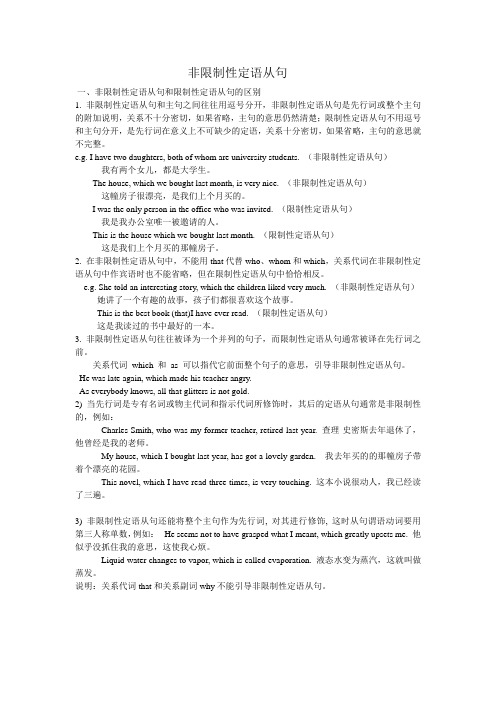
非限制性定语从句一、非限制性定语从句和限制性定语从句的区别1. 非限制性定语从句和主句之间往往用逗号分开,非限制性定语从句是先行词或整个主句的附加说明,关系不十分密切,如果省略,主句的意思仍然清楚;限制性定语从句不用逗号和主句分开,是先行词在意义上不可缺少的定语,关系十分密切,如果省略,主句的意思就不完整。
e.g. I have two daughters, both of whom are university students. (非限制性定语从句)我有两个女儿,都是大学生。
The house, which we bought last month, is very nice. (非限制性定语从句)这幢房子很漂亮,是我们上个月买的。
I was the only person in the office who was invited. (限制性定语从句)我是我办公室唯一被邀请的人。
This is the house which we bought last month. (限制性定语从句)这是我们上个月买的那幢房子。
2. 在非限制性定语从句中,不能用that代替who、whom和which,关系代词在非限制性定语从句中作宾语时也不能省略,但在限制性定语从句中恰恰相反。
e.g. She told an interesting story, which the children liked very much. (非限制性定语从句)她讲了一个有趣的故事,孩子们都很喜欢这个故事。
This is the best book (that)I have ever read. (限制性定语从句)这是我读过的书中最好的一本。
3. 非限制性定语从句往往被译为一个并列的句子,而限制性定语从句通常被译在先行词之前。
关系代词which 和as 可以指代它前面整个句子的意思,引导非限制性定语从句。
He was late again, which made his teacher angry.As everybody knows, all that glitters is not gold.2) 当先行词是专有名词或物主代词和指示代词所修饰时,其后的定语从句通常是非限制性的,例如:Charles Smith, who was my former teacher, retired last year. 查理·史密斯去年退休了,他曾经是我的老师。
非限制性定语从句

3. She has two brothers, who are both doctors. 4. Last Saturday they reached Shanghai, where a meeting is to be held. 2. 在非限制性定语从句中as与which可以在整个主句 作为其先行词指代上面或下面说的一件事,其区别如下: 1. a.从意义上来看which(=and this/that)可以译为“这/ 那”as(=in accordance with what)译为“正如、象”。 He is a teacher, which(=as )is clear from his manner 或He is a teacher, as(=which) can be seen from his manner.
8.They have visited the Museum of Chinese History where ___________Premier z h o u ‘ s life and deeds are being shown. whose 9.Alice,_______dress is all red, looks very pretty. that 10.The first thing ________I am going to do this evening is to write a report about the experiment.
一.用适当的关系代词或关系副词: Who,that 1.Yesterday I met doctor Wang _____told me the good news of his son's passing the examination. Who / that / whom 2.The two pupils______ you taught three yeas ago have become teachers. when 3.He began to work in Beijing in the year______ New China is founded. when 4.I don't know the reason______ she didn't agree to our plan. Who/that 5.This is a soldier________ died in the war of Resistance
定语从句的非限制性和限制性用法

定语从句的非限制性和限制性用法定语从句是英语语法中的一个重要结构,用于修饰名词或代词,使句子更加具体和丰富。
定语从句可以分为非限制性和限制性两种用法,下面将详细介绍这两种用法。
一、非限制性定语从句非限制性定语从句用于对名词的某一方面进行补充说明,这种从句不是句子的主要成分,如果去掉也不会影响句子的完整性。
非限制性定语从句通常用逗号或者括号与主句分开。
1. 逗号分隔例如:The book, which I bought yesterday, is very interesting.那本书,我昨天买的,非常有趣。
在这个例子中,which I bought yesterday是非限制性定语从句,修饰名词book。
从句用逗号与主句分隔开来,强调的是这本书非常有趣。
2. 括号分隔例如:My brother, (who is a doctor), is coming to visit me.我的哥哥(他是个医生)要来看我。
在这个例子中,(who is a doctor)是非限制性定语从句,修饰名词brother。
从句用括号与主句分隔开来,强调的是我的哥哥是一个医生。
二、限制性定语从句限制性定语从句用于对名词的某一方面进行限制或者解释,这种从句是句子的主要成分,去掉将会使句子变得不完整。
限制性定语从句与主句之间没有逗号或括号分隔。
例如:The book that I bought yesterday is very interesting.我昨天买的那本书非常有趣。
在这个例子中,that I bought yesterday是限制性定语从句,修饰名词book。
从句与主句之间没有逗号或括号分隔,强调的是我昨天买的那本书非常有趣。
定语从句既可以使用关系代词(如that、which、who等),也可以使用关系副词(如when、where、why等)引导。
例如:- 关系代词引导的定语从句:The man who is standing there is my father.站在那边的那个人是我爸爸。
什么是非限制性定语从句

什么是非限制性定语从句?非限制性定语从句是英语中的一种定语从句形式,用于为名词或代词提供额外的信息和描述,但不是必需的。
与限制性定语从句不同,非限制性定语从句通常用逗号或者括号将其与主句分开。
下面是关于非限制性定语从句的一些重要信息:1. 引导词的选择:非限制性定语从句通常由关系代词(who, whom, whose, which)或关系副词(when, where, why)引导。
引导词在从句中充当主语、宾语或者定语。
例如:- My brother, who is a doctor, lives in New York.(我的兄弟,他是一名医生,住在纽约。
)- The book, which I borrowed from the library, is very interesting.(我从图书馆借来的那本书非常有趣。
)2. 逗号的使用:非限制性定语从句通常用逗号将其与主句分开,以示从句与主句之间的区别。
逗号的使用不仅可以提供语法上的指示,还可以帮助读者理解从句是额外信息的一部分。
例如:- John, who is my best friend, is coming to visit me.(约翰,我的最好的朋友,要来看我了。
)- The company, which is located in London, has been in business for 20 years.(这家位于伦敦的公司已经经营了20年。
)3. 从句的位置:非限制性定语从句可以出现在句子的开头、中间或结尾,具体位置取决于句子的结构和意义。
例如:- My teacher, who is very knowledgeable, taught me a lot.(我的老师很有知识,教了我很多。
)- I visited the museum yesterday, which is located downtown.(昨天我参观了市区的博物馆。
- 1、下载文档前请自行甄别文档内容的完整性,平台不提供额外的编辑、内容补充、找答案等附加服务。
- 2、"仅部分预览"的文档,不可在线预览部分如存在完整性等问题,可反馈申请退款(可完整预览的文档不适用该条件!)。
- 3、如文档侵犯您的权益,请联系客服反馈,我们会尽快为您处理(人工客服工作时间:9:00-18:30)。
词性成分,相当于形容词,所以又称为形容词性从句,一般紧跟在它所修饰的先行词后
面。
定语从句又分为限制性定语从句和非限制性定语从句。限制性定语从句对被修饰的
先行词有限定制约作用,使该词的含义更具体,更明确。限制性定语从句不能被省略,
A.which
A.which
B.who
B.who
C.that
C.where
D.whom
D.that
4.I paid a visit to compony last month, ___ C. my brother are working. 5.The car accident happened in 1990, ___ B. I was a six-year-old child.
彼得现在回巴黎了,你在伦敦见过他。
The boy, whose father is an engineer, studies very hard.
那位小男孩学习很努力,他的父亲是位工程师。
2-2 The defination
非限定性定语从句起补充说明作用,在句子中不充当成分,缺少也不会影响
全句的理解,它与主句往往用逗号隔开。
Grammer
非限制性定语从句
Non-restrictive Attributive Clause
Step1 Revision
目录
Contents
Step2 Lead-in
Step3 The Grammer
Step4 Summary
01
Part One Revison
1-1 The Attributive Clause
否则句意就不完整。
1-2 Exercise
1.That is the day ___ A. I'll never forget.
A.which B.on which C.in which D.when
A. 2. The place _______interested me most was the Children's Palace.
eg:The boy, whose father is an engineer, studies very hard.
3-1 The choice of the relatives
4.which引导
关系代词which在非限制性定语从句,中所指代和修饰的可以是主句中的名词、形 容词、短语、其他从句或整个主句,在从句中作主语、动词宾语、介词宾语或表语。
A.which B.who C.whom D.when
A. in fact they 2.The two policemen were completely trusted,___ were.
A.which B.who C.whom D.that
3-2 Exercise
3.When deeply absorbed in work,___ A. he often was,he would forget all about eating and sleeping.
3-1 The choice of the relatives
5.when引导 关系副词when在非限制性定语从句中作时间状语,指代主句中表示时间的词语。 eg:He will put off the picnic until May 1st, when he will be free.
6.where引导
副词where在 eg:They went to London,where they lived for six months.
此外还有as引导的非限制性定语从句和介词+关系词的特殊结构,我们将在下节课
中进行讲解。
3-2 Exercise
B. 1.My gardener,_______is very pessimistic,says that there will be no apples this year.
3-1 The choice of the relatives
(2) which指代主句中的形容词。
eg:She was very patient towards the children,which her husband seldom was.
(3) which指代主句中的某个从句。
eg:He said that he had never seen her before,which was not true. (4) which指代整个主句。 eg:In the presence of so many people he was little tense, which was understandable.
02
Part Two Lead-in
2-1 Example sentence
Our guide,who was a French Canadian,was an excellent cook.
我们的向导,一个法裔加拿大人,擅长于烹调。
Peter, whom you mey in London, is now back in Paris.
3-1 The choice of the relatives
1.who引导
eg:Our guide,who was a French Canadian,was an excellent cook. 2.whom引导,关系代词whom用于指人,在句中作动词宾语和介词宾语,作介词宾
语时,介词可位于句首。
非限制性定语从句是先行词的附加说明,去掉了也不会影响主句的意思,它 与主句之间通常用逗号分开,将非限定性定语从句放在句子中间,其前后都 需要用逗号隔开。
2-3 The differences
The differences Restrictive attributive Clause and Non-R estrictive Attributive Clause
eg:Peter, whom you met in London, is now back in Paris. Mr Smith,from whom I have learned a lot,is a famous scientist. 3.whose引导,whose是关系代词who的所有格形式,在从句中作定语。whose通常 指人,也可指动物或无生命的事物。
A.which B.when C.where D.that
04
Part Four Summary
Summary
非限制性定语从句 关系词的分类与选 非限制性定语从句 与定语从句的区别 择 关系词which的用 法
02
01 03
Summary
Thank You
A.which B.where C.in which D.what
B. st summer we visited the West Lake, ______Hangzhou is famous in the world.
A.for that B.for which C.in which D.what
(1)which指代主句中的名词,被指代的名词包括表示物、婴儿或动物的名词、表示
单数意义的集体名词以及表示职业、品格等的名词。 eg:These apple trees,which I planted three years ago,have not borne any fruit. Water,which is a clear liquid,has many uses.
限制性定语从句对被修饰的先行词有限定制约作用,使该词的 含义更具体,更明确。限制性定语从句不能被省略,否则句意就不 完整。非限制性定语从句与先行词关系不十分密切,只是对其作一 些附加说明,不起限定制约作用。如果将非限制性定语从句省去, 主句的意义仍然完整。.
03
Part Three The Grammer
